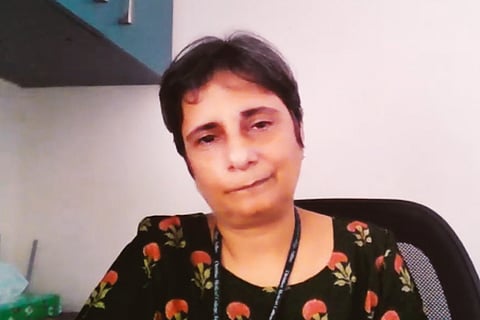

Noted virologist Dr Gagandeep Kang said that she is not surprised that India has detected two cases of the Omicron variant. “The fact that the person from Bengaluru had no travel history underlines the fact that the variant may have been around in India for weeks. The important thing for us to understand is how much the virus spreads, how severe the disease it causes, and how we can protect people,” she said in an interview to TNM.
Although there have been reports suggesting that Omicron causes three times more reinfection than the Delta variant, Dr Kang said it’s not a cause of worry. “I am not worried about reinfections. All coronaviruses reinfect. As long as the reinfections are mild, that’s not something we need to worry about,” she said, adding, “What we need to worry about is what happens to people who have not been vaccinated and get infected. And we don’t have data to tell us about that.”
As far as vaccine efficacy goes, she said that scientists at the moment don’t have a clear understanding on how resistant Omicron is to the COVID-19 vaccines. “But if we look at how vaccinations work in all variants so far, vaccinations protect. It protects to varying extents. If we look at an unvaccinated person, a doubly vaccinated person, a triply vaccinated person and an infected and vaccinated person, who is best off? Best off is the infected and vaccinated person. After that the triply vaccinated person, after that the doubly vaccinated person. And the worst off is the uninfected and unvaccinated person,” she said.
Dr Kang said that India needs to double vaccinate all vulnerable people above the age of 60 at a war footing. She also said that even if India decides to give booster doses, the population above 60 years should get it first. “Boosters should go to elderly first. Most health care workers are young and relatively healthy people. This is why I think the elderly should get priority for two doses and three doses.”
She also said lockdown or even shutting down schools, colleges and offices is not the way forward. “How will you prevent transmission with a shutdown? It is an asymptomatic infection, do you then shut school forever? We cannot stop asymptomatic transmission forever, the only way then is to stop people from coming into contact with each other forever, that is not sensible. Healthy children are best able to handle the virus. Detecting clusters and slowing down transmission rates is the way.”
“Lockdowns were fine when we did not have the tools we have now, when the aim was to flatten the curve. Now we have vaccines, drugs, medical interventions, so we need to plan our current strategy based on tools we have today and not based on reactions last year. Lockdowns make no sense, travel bans make no sense. Testing before and after travel makes sense, the entry of new variants into the country will be slowed down and there is time to learn more about the variant,” she also said.
Dr Kang advocated that India needs a new testing strategy in place, where we use more rapid antigen tests to identify people who were in contact with a COVID-19 patient and are vulnerable. “The rapid antigen tests will not tell us whether we are infected with variants, but it will tell us quickly if people are infected. The strategy can be to quickly do a rapid screen of everyone in touch with a patient.”
Watch the full interview: